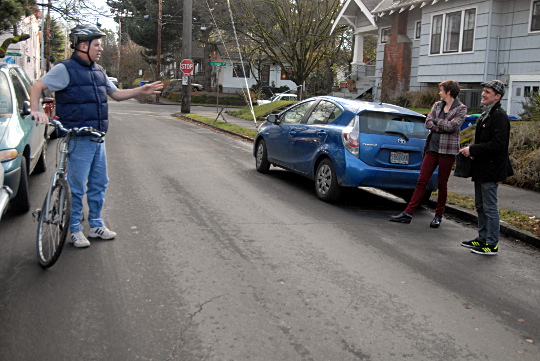
(Photos: M.Andersen and J.Maus/BikePortland)
Last year, Portland hired a top-dollar consulting firm for advice on the best way to manage the auto parking that’s become increasingly scarce in a few neighborhoods.
Twelve months later, the city is taking steps toward some of its recommendations: for example, proposing an opt-in parking permit system that would let residential neighborhoods block their street parking spaces from being used by people living or shopping on commercial corridors.
But at the moment, Portland is on course to ignore a different suggestion made very clearly by the firm, Nelson\Nygaard: that elected officials should “never, ever” be the ones to set the price of parking.
“It’s so important to save the elected officials from themselves — their job is to adopt policy, their job is not to micromanage the city,” said Jeff Tumlin, the top parking expert at San Francisco-based consultancy. Setting the price of on-street parking, he said, is “not a city council’s job. It’s really bad. These conversations quickly get so emotional and irrational that they should never be argued at city council.”
Instead, Tumlin said city councils should agree on the outcome they’d like to see: one available parking space on every block, for example, or one guaranteed parking spot for every home in a residential neighborhood. Then they should direct their staff to come up with meters, permits, quotas or other systems to get to that outcome.
Tumlin spoke in an interview with BikePortland Wednesday that reiterated the advice he gave a roomful of 130 Portlanders back in June.
“If I were an elected official, the last thing I would ever want is to have parking prices on the agenda.”
— consultant Jeffrey Tumlin
“If I were an elected official, the last thing I would ever want is to have parking prices on the agenda,” Tumlin said. “Even if you satisfy your constituents on the parking issue, you often have not satisfied them, because the real issue is something else.”
But as Portland considers letting neighborhoods vote to create overnight residential parking-permit districts, the city staffer managing the project said the current plan is for city council to make all the permit pricing decisions.
“City Council adopts the transportation fee schedule annually by ordinance,” city project manager Grant Morehead said Wednesday. “The fee structure of the residential parking permits will be adopted through this annual process.”
One week from today, the city’s year-long parking reform process will get a Portland City Council work session for the first time. In preparation for that, we talked to a few experts around town to find four ways that Portland could follow its consultant’s advice.
Here they are.
Advertisement
1) City staff could take an informed guess about the right permit price and see what happens
The most obvious way for Portland to follow Tumlin’s advice would be to simply have the city’s appointed staff, instead of their elected bosses, take a stab at the right price.
This wouldn’t be an impossible task. Staffers could base the price on what it is in other cities, or on the going rate for off-street parking in the neighborhood, or simply make sure it covers the cost of administration and enforcement.
Morehead, one of the staffers who’d likely be involved with that effort, said Wednesday that this wouldn’t work well, because parking permits last for a full year. If the city guesses wrong, it might have to keep fiddling with the permit price for several years to get it right.
“The time frame is so long,” Morehead said.
Advantages: Straightforward. Responsive to political pressure.
Disadvantages: Could take years to get right. If the price is too low, there could be years-long waiting lists for a parking permit. If it’s too high, no neighborhood will ever vote to create a permit district and the whole policy will be pointless.
2) The city could let neighborhood groups add to their district’s permit price and use the money for things they want
If a city parking permit goes for, say, $11 a month — that’s what they cost in Toronto and San Francisco — the city could give neighborhood groups the option of tacking on a few more bucks that would raise money for neighborhood infrastructure (a crosswalk beacon, a bus shelter, a public trash can) or programs that reduce driving to the area (subsidized transit passes for employees of local shops). That’s what the Central Eastside Industrial District already does with its daytime parking permits.
Advantages: Would let neighborhoods set rates appropriate to their area (Hollywood’s parking permits are probably more valuable than the ones in St. Johns). Would give neighborhoods a reason to create permit districts: it could become a steady source of cash for some neighborhood associations.
Disadvantages: There’s no reason to think neighborhood association leaders would be any better than elected officials or city staff at figuring the right price. If they get it wrong, see “disadvantages” beneath the previous item.
3) The city could let people resell permits they don’t need
This simple measure would have surprisingly far-reaching results.
When someone signs up for a parking permit, one of the things it could include would be the right to give it to someone else.
This simple measure would have surprisingly far-reaching results.
This is a suggestion from Portland Planning and Sustainability Commissioner Chris Smith, who said he sympathizes with longtime residents of neighborhoods that have been getting denser.
“We’ve flooded their streets with cars,” he said. Smith said it makes sense for “folks who’ve had their lives changed” to get something for that trouble, if they vote to create a parking district: a spot at the front of the line for a parking permit, if they want one. Or, if they don’t want one, the ability to get a permit and then resell it to anyone else who might want it: a resident of a nearby apartment, the manager of a nearby restaurant.
If every permit in a district were sold — except maybe for an allowance the city would reserve for poor residents or people with disabilities — someone who wanted a permit would track down someone who didn’t need theirs and buy it. When people left the neighborhood, they could sell their permit to whoever might be moving in, or just let it return to the city’s pool of unused permits.
Advantages: Residents would set the price of their permits for themselves by deciding what they’re willing to pay for one. People would have a reason to vote for permit districts because they would be creating a valuable commodity for themselves.
Disadvantages: Doesn’t earmark money for neighborhood projects or services. Creates a stronger sense that residents own public space when they don’t.
4) The city could sell permits with a Vickrey auction.
Each year, everybody interested in a permit for a given district could record what they’re willing to pay for it. Say the district had X available parking spaces. The city would put all the bids in descending order, count down X slots and give permits to everyone in that group … but they would only have to pay the price bid by person X, the cheapest of all the winning bids.
This is a concept from Tony Jordan, president of the Sunnyside Neighborhood Association and one of the city’s most active volunteer parking wonks. It uses the same system that Google used when it started issuing public stock.
“Say you have 5 things for sale, you have bids for $1000, $900, $800, $700, $600, $500, and $400,” Jordan explains. “Everyone who bid $500+ gets the item at $500.”
Advantages: Residents would set the price of their permit for themselves by deciding what they’re willing to pay for one. Would raise a lot of money for either the city or neighborhood improvements.
Disadvantages: Complicated. People might not vote to create a system they don’t understand.
After puzzling through these options, I had one more question: is this question — how to remove parking permit prices from the direct oversight of the city council, as Tumlin recommended — even part of the parking permit committee’s job?
Absolutely it is, said Lidwien Rahman of the Oregon Department of Transportation. She ought to know; she awarded the grant that is paying for the city’s reform effort.
In fact, Rahman seemed to hope that the committee will help the city answer this question: not exactly how much the permits would cost, but how to find the right price.
“The advisory committee can definitely recommend whatever they want,” Rahman said.
— The Real Estate Beat is a regular column. You can sign up to get an email of Real Estate Beat posts (and nothing else) here, or read past installments here.




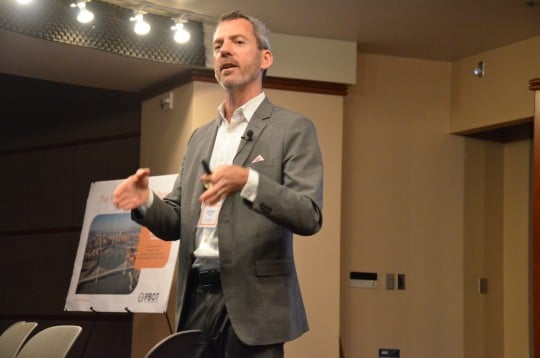
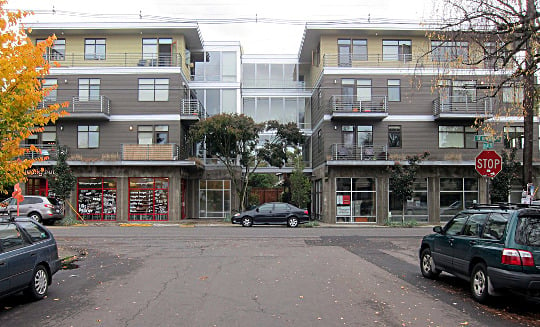
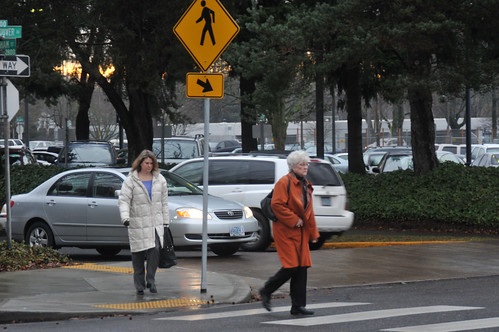
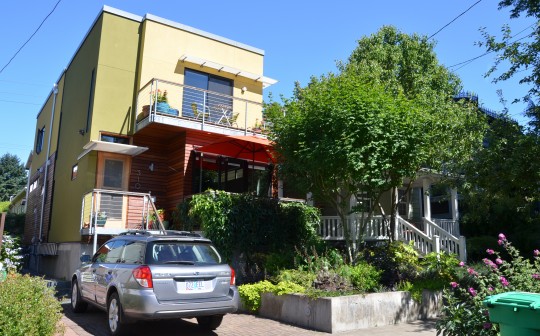
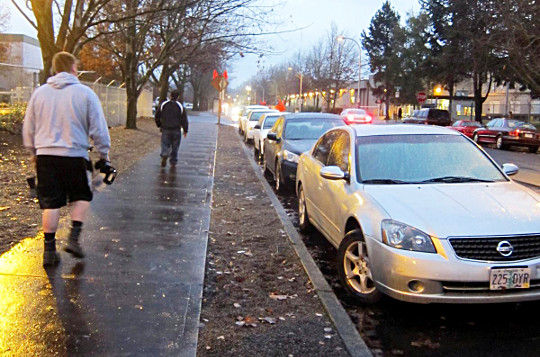
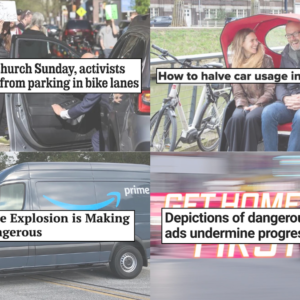
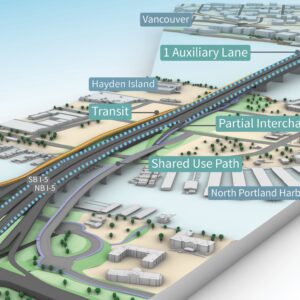
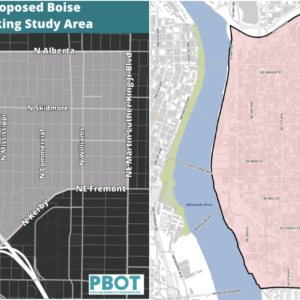
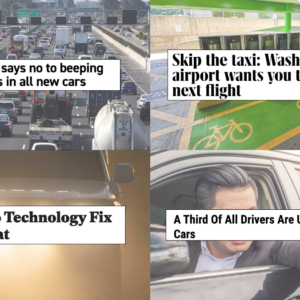
Thanks for reading.
BikePortland has served this community with independent community journalism since 2005. We rely on subscriptions from readers like you to survive. Your financial support is vital in keeping this valuable resource alive and well.
Please subscribe today to strengthen and expand our work.
It’s ironic that the disadvantages cited in the first example (PBOT takes a guess) are present in the currently suggested process (let council set the rates) except based on less information, more vulnerable to political influence, and less likely to ever change.
At the very least, there needs to be a methodological process to set these rates that is evaluated on a timely basis and adjusted outside of the political process.
Option 5 – run whatever approach you choose past TonyJ first to make sure you’re not missing something. 🙂
Regarding #3, here in SF bay area many cities are sending cease and desist letters to homeowners selling their private parking spaces (often using mobile apps). It seems to violate ordinances against commercial business in residential zoning, and councils are concerned the practice creates neighborhood parking shortages (which ironically it’s trying to address, here).
I’d like a clarification: would the city sell only enough permits that everyone who gets one is guaranteed a place to park? If so, why not individually allocate spots so you know where yours will be, and that it will be available when you need it? That would have the added benefit of being more valuable and reducing time spent circling the block looking for a free spot.
There would be issues with maintenance closures though (they would have to take away specific spots), or moving trucks.
This also gives the incorrect impression that the permit holder “owns” that part of the road.
It’s not private property. Everything they’ve done so far leaves me thinking they’ll still allow guest parking of 1-4 hours, and sell day passes for homeowners who need a spot for their contractor to park all day, or for a family barbecue etc…
So what happens if I’ve paid for parking, but there is none available? That sounds like a recipe for pushback if it happens much.
You’ll park farther away. Pushing back to what? Unregulated “free” parking on the street? That’s what we have now and neighbors are very welcome to keep it that way. The craziest scheme I could propose is more likely than the city allowing one person to own the space in front of their house. The price for such a thing is already known, you build a driveway and you apply for a permit to make a curb cut.
All I’m saying is that if people pay for something, they have a reasonable expectation that they’ll get it. That puts a limit on the number of permits that you can sell, because you need to ensure that, most of the time at least, there is a parking spot available for every permit holder. Do you agree with me at least to that extent?
If there are 100 spaces available in a district, do you sell 90, 100, or 110 permits? How many spaces do you keep “open” for casual use by customers or visitors, or for the special permits people may need to buy for whatever reason?
I think that should depend on what the price is, hence this article. The current plan is to limit the permits to supply. BUT there’s always visitor parking so you’ll never be guaranteed a spot because people can park for some time (likely 2 hours) anywhere.
If the price is laughable (60 a year) then what are people paying for? If the price is market rate then you have a real argument to make about the value for pricing.
Ideally everyone would be allowed to park anywhere and everyone would pay a time based rate for the privilege.
If you are only allowed to park in a specific space what do you do if someone else is parked there? Illegally park in some other person’s space?
The city has pushed back pretty hard on the idea of rationing parking spots by income. Thus far they’ve rationed spots by limiting who is allowed to take part in the parking market. If you want to park a mile or two from your destination then bike or transit the rest of the way they’ll exclude you. If you live or work a block away in the ‘commercial’ zone they’ll exclude you. The permits won’t end up too pricey.
kitty, what you’re describing is a garage. assigning specific spots to individual permits entirely defeats the purpose of a public parking permit system. not only does it create a false sense of “ownership” of public space, as others have pointed out, but it greatly limits the overall parking capacity of an area and adds to the (often imagined) scarcity of parking.
Well… what is the purpose of a public permit parking system? I believe it’s to ensure that people with permits have a place to park. I think what I proposed is entirely consistent with that goal, and would provide more utility to permit holders, potentially more revenue to the city (more valuable permits could be sold for more $$), and would reduce pollution and traffic from people driving around looking for a free spot.
I’m assuming that the city can’t sell more permits than there are spaces; if they do, some permit holders won’t be able to park in their neighborhood, which is what the program is designed to facilitate.
5) don’t issue any permits… if people want a guaranteed parking space they can dedicate some space on their property to it…
if it’s that bad then somebody will build a parking garage…
I agree! The street I live on is starting to get a bit crowded so I am clearing out my old 1920’s detached garage and getting bids for a garage door. Garages are a bit small in the 20’s, but I think I can make it work. If not, I’d just put in a gravel parking pad.
Depending where you are at it could be an easy solution or complex problem. My parents house has a lot of trees, the most in the neighborhood, and each is at least 40 years old. To put a single parking space in they would have to remove a whole tree which removes shade, shelter, and food from local critters.
Mostly they are common critters like Scrub Jays, Squirrels, Sparrows, Crows, Finches, Hummingbirds. Uncommonly raccoons, possums, and mice. Once there was a Peregrine Falcon.
Or does the property even have room for a parking spot to be added without blocking the sidewalk. Questions questions.
Have they considered getting rid of their car(s)?
With Getaround, Zipcar, Trimet, bikes, etc. there are a lot of very affordable alternatives now.
My Mom works in Salem as a nurse and my Dad works in the NW Industrial District. He does make an effort to bike in the summer and doesn’t drive any distance under a mile, he has even skiied during snowy winters. The biggest problem is Mom leaves for work at 5pm when Dad gets back at 6pm.
Kenton, so close yet so far at times.
To follow, my Dad is a giant at 6’5. It’s really funny watching him use his bike since the handle bars don’t go high enough for him. Dunno if he would fit in a Smartcar
The one thing I would say is that there are LOTS of Portland garages filled up with so much junk that you can’t fit a car. Probably 99% of houses have a garage or driveway.
“block their street parking spaces from being used by people living or shopping on commercial corridors.”
Overnight parking districts would stop people from parking during the day or evening for shopping/dining though, right?
If they did, then you would likely never be able to get rid of any parking on arterials (so good luck every getting a bike lane on Division).
Sooooo many issues seen here – and so many benefits towards homeowners. Our work used to pay for Zone G/N parking passes, but would only bus passes before taxes. When employees began to raise a stink about it that they were essentially encouraging car culture, work axed the parking passes. (They still pre-tax the bus tx out of people’s pay checks if you sign up for that. But you’re essentially paying for that yourself. Just saving 50c or whatever.)
The thing is that parking is huge problem in the city – and if you make the passes unaffordable, you are favoring the upper income bracket over the lower income bracket who may rely on the car. It’s asinine.
What needs to happen is that since the developers are buying up every corner lot in the city they deem fit, how about some sustainable development in underground lots? Mixed use-buildings? It only takes some of the burden off, but it takes some off.
The city also needs to be in serious conversation with Trimet about the future of our bus and lightrail line. We’ve already outgrown it and they just added the orange line. We need to start looking at San Fran (which runs 24 hrs a day,) at Chicago, at Boston, at New York – we can begin to learn from what they did wrong and what they’ve done right. We can look at Salt Lake City, which now has three light rail lines and a passenger train that runs from Provo past Ogden (about 100 miles), and they were able to accomplish all of this in less than 10 years.
Portland needs a light rail in the N/NE/E. Portland needs public transit that runs longer than 12pm (and more frequent than every 45 minutes) – people aren’t going to take it seriously if we are only using it as something that rich people take to Timbers games when they don’t want to deal with parking. We need to treat community transportation as something that we need to invest in seriously; we need to divest in private transportation and get serious about enforcing law breakers to show that it’s a privilege to be a car owner, not a right.
It seems I heard that Trimet is actually considering adding service throughout the night on a few lines. (What used to be called “Owl” service, perhaps as in “nightowl”)
We sorely need this in Portland. How else are drunk people supposed to get home after 2 am?
Taxis / Lyft.
just to say. Underground lots and affordable housing are at odds with one another. The cost is just astronomical. If you don’t have a price for on street parking and you make developers build underground garages, then you have other problems. Either the developer raises the rent a bit and also charges for renting a space separately and no one rents a space because the street is “free,” or you make the price be bundled in the rent and the rent is 300 a month more. All so no one has to pay to park on the street.
Are you saying that a landlord would charge less rent if their costs are less? Economics suggests they will charge as much as they can, and that decision is at least somewhat disconnected from construction costs.
Where you might have an argument is to say fewer buildings would get built, but with current market conditions, I’m not sure many opportunities would get passed over.
It is our market that is at odds with affordable housing, not parking requirements.
There are supply based price considerations and there are the costs of building and operating a building. The cost of the unit (including parking if needed) + profit needed to make the operation viable = the floor, the lowest the unit will rent for.
A required 1-1 ratio, which many neighbors would like to see, would, as you point out, chill the development which would exacerbate the supply problem and make prices go up even further. Not requiring parking leads to a greater supply and a lower floor for the theoretical lowest rent that makes economic sense.
I see what you’re saying, but once a building is built, the owner will rent it for as much as they can. If there is a market downturn, they may have to rent below cost and take a loss since they cannot “unbuild”.
Once the decision to move forward is made, rents become decoupled from construction costs.
But the relationship between how much a building costs to build and how much it will rent for strongly informs the decisions of developers in how many buildings and units to build. If buildings are cheaper to build (because off-street parking requirements get removed by City Council) then developers will build more buildings, which will eventually drive down rent at the metro area level / cause it to rise more slowly.
Underground parking lots are about the furthest from sustainable you can get. They are enormously expensive (typically costing more per space than the cars parked in them), which the developers will surely offload the costs onto the renters. It also directs funds from building more housing units instead. Plus, underground parking is still car parking and thus encourages more car dependency.
Yup, usually underground parking costs 30,000 to 40,000 dollars per space. And the cost is all in moving lots of dirt with heavy diesel-powered equipment, then pouring concrete retaining walls and pillars, so a huge amount of that cost goes directly into burning oil and producing carbon dioxide.
If you require 2 parking spaces for a 2 bedroom apartment, like Los Angeles does, then you have added $60 to 80,000 to the base price of every apartment, compared to no parking. That raises the minimum marginal cost of new housing, and directly raises the price of rents in areas with housing shortages (almost every neighborhood in Portland).
Say it costs $200 per square foot to buy land, build, finance and sell a new 6-floor apartment building at a 10% profit rate. That means an 800 square foot 2 or 3 bedroom apartment will cost $160,000 without parking, and $220 to 240,000 with 2 underground parking spaces. A 400 square foot 1 bedroom with 1 underground parking space would cost $80,000 without parking, and $110 to $130,000 with underground parking! That’s a 27 to 37% price increase.
If the construction price is even cheaper (you can build 2 floor wooden apartment buildings on cheap land in East Portland for $100 a square foot), then going to underground parking could increase prices by more than 50% just for one space per 1 bedroom unit!
I want late-night buses so so much.
Remove street parking on Skidmore from Interstate to MLK…NOW!
Good point! IF NA’s are able to set parking prices and reap rewards, they may become formidable foes against any bike improivments that removes parking. Portland should establish bike lanes on Skidmore and Front before it becomes much more difficult!
Giving neighborhood associations the right to set fees (e.g. legislate) for parking could be challenged in court given Oregon’s vote by mail requirement.
Interesting point. To be clear, though, the NA would only be the one “writing the ballot issue” under the proposed scenario. The city would administer the vote and (if I remember right) the ballots would be mailed.
We need to move to a ward-based system where NA’s actually have voting power and must send out ballots to the entire neighborhood instead of the tiny fraction of people who bother to show up for elections. No way in hell I’d want the typical NIMBY, anti-density homeowners who make up most of Neighborhood Associations influencing parking prices.
And we’re going to pay for that how?
We get pretty low voter turnout for local only elections as it is (something like 20-30%), I have to imagine the response would be even lower if the city were to add even more micro voting.
Parking permits make the city cost more.
Thus, pushing out the poor.
Then stop designing cities that force the poor to drive everywhere.
Too late!
Charge high prices for parking and use the money to make the car-dominant neighborhoods more friendly to people via road diets, wider sidewalks, and protected bike lanes.
People choose to pay dearly to drive. They know they could save money by car-pooling, taking the bus, walking, taking MAX, moving closer to work, etc. This is the United States, land of the free. People are free to do what they want. They choose to drive because they like to drive. Don’t like it? Move to another country. Problem solved.
“People are free to do what they want.”
If they are sitting in a car.
If they are biking, not so much.
“They choose to drive because they like to drive.”
Really? What percentage of the folks who drive fit that description, would you guess?
They choose to drive because they like it better than their other options. I would say that applies nearly 100% to everyone who has another option but has chosen to drive anyway.
Let’s make the other options better!
“They choose to drive because they like it better than their other options. I would say that applies nearly 100% to everyone who has another option but has chosen to drive anyway.”
You’re skipping right past the elephant in the room.
Ascertaining whether people have another option, whether the options we may think they have strike these people as realistic, etc. is all important. Sitting here in my arm chair I can pontificate all day about how every person I know in principle could choose another mode of transport. The problem is that is very likely quite different from how they see this situation. Cars are all about habit, and the impetus to try something different when most of the costs of driving are already sunk, is low indeed. And their peers all drive….
For all we know they’ve never actually tried any of the other options: walking, biking, taking the bus. If that is so, then how could we possibly infer that they prefer sitting in a car?
I absolutely agree that there are many who, if they gave it a chance, would enjoy riding more than driving. My thinking is that it is better to make riding more attractive (for those who can do it) than it is to make driving worse for everyone (including those who have to do it).
Of course, if given the chance, I would favor a large increase in the gas tax, not as a punitive measure, but rather as a way to pay for the improvement of alternatives.
Better alternatives = less driving = better for drivers = better for non-drivers.
“My thinking is that it is better to make riding more attractive (for those who can do it) than it is to make driving worse for everyone (including those who have to do it).”
That is a generous attitude but I think we know from the experience of many countries (Europe for starters) that making driving more difficult is a key piece of this effort. Roger Geller even conceded this not so long ago.
I don’t actually agree that the driving experience is “worse” in places like Germany. In fact, in many ways, it is better and more pleasant than here. But Germany also has great alternatives. Plenty who could drive between cities take the train, for example, an option that only the most masochistic would consider here. And because the cities have been reworked to make it possible to get around without a car, fewer people drive (but many still do).
The alternatives in Germany are far better than here, and that has allowed them to scale back on the infrastructure needed to support driving (at least in the cities… in villages and intercity, driving is still quite well supported).
I agree with you, Hello,Kitty.
But we have to remember that many people who drive (or at least the vocal ones) here in the USofA seem to think that being restricted to driving no more than 19mph (30km/h) in town would be an outrage. And the narrow streets! And the exorbitant fees! And the requirement to attend driving school and pay thousands to get a driver’s license! And not being allowed to drive in the Fußgängerzone!!
All of the shenanigans that the European countries who value bicycling over driving (viewed historically) have dreamed up are—as many of us here would probably agree—better for society, but they can easily also be perceived by those who want to see this as a turf war as concessions, as making driving more difficult.
Why are your posts gray?
Did you finally post so much you’ve gone platinum?
He subscribed.
I did subscribe, but I’m not seeing what you are seeing. What do you mean by gray?
your posts are colored gray (the way Michael’s are tan). You are the only one to have gray colored posts.
Yeah, that showed up for me later in the day, too.
I learned at the big bikeportland bash last night that this will be one of the perks that comes with subscribing.
It was a great event.
The answer to your question is, as Hello Kitty said, nearly 100%. There are things about driving that people don’t like such as traffic, the expense, crappy pot-hole infested roads, etc but in general people LOVE to drive cars. They’re nice, comfy, good music, private, etc, etc, etc and they take you to any place you want to make good memories, have fun, etc.
“The answer to your question is, as Hello Kitty said, nearly 100%.”
Is it too much to ask that you support your assertions?
http://www.pewsocialtrends.org/files/2010/10/Cars.pdf
“When asked whether they like to drive or consider it a chore, 69% of drivers in the Pew survey said the former, while 28% said the latter.”
There are surely many ways to ask this question, many ways to even decide who to poll, but nearly 100% seems a rather sloppy answer given what we know. And the framing above still falls short of my main concern with this sort of question, which is that most people who habitually drive probably have very little experience with alternatives so asking them to rank driving against those other options would be pretty meaningless.
Polls are full of it. The proof is in the pudding. As you have stated, all car drivers, with no exception, understand that they have other options for getting around. But they prefer to drive so that’s what they do. Driving on congested roads/streets is a chore, but I love it, and as your poll says 70% agree with me.
I used to commute 15 miles one way to work. Sometimes I’d bike, but it is a hassle. Have to take a shower when you get there (many do not have showers at work), have to haul your work clothes and make sure you don’t forget anything, have to be cold and miserable in the AM, possibly wet and miserable, possibly hot and miserable on the way home in the PM, dodge traffic and potholes, wonder if your bike will be vandalized, etc. Much of they year it’s dark when you leave/come home. And then when you get to work you’re tired. It’s good exercise, but it’s a royal pain in the butt. A 2 or 3 mile commute would be better – no need for a shower, etc.
People, for the most part, are not going to bike to work. Not as long as they think they can afford to drive a car; but if you want more people to dislike cyclists, join a movement led by cyclists, that proposes to charge people for the same on-street parking they have enjoyed for free for many years.
“People, for the most part, are not going to bike to work.”
That is fascinating. How do you explain the trend away from cars and toward bikes, not just in Portland, but pretty much anywhere in the overdeveloped world?
All those things you described pale in comparison to the hassle of driving in rush-hour traffic for me. Yes, some workplaces don’t have showers, but an increasing number do, and you’re prone to shower daily at one place or another (home, gym, work, whatever). My last bike commute was either faster or as fast as driving, and people at the office never believed me until a coworker saw me pull onto a backed-up road and pull away shortly after he’d been on the highway doing 70, and word got around. Two more people started biking immediately after that. Many of the ‘barriers’ you mention are artificial – they’re conveniences, not necessities.
Yes, people love to drive, but so much driving is done out of sheer laziness. I’ve lived in three places that were in short walking distance to groceries, yet frequently observed neighbors driving there nightly instead of planning better and stocking up, or merely walking over for such small amounts. Bottom line is that cheap gas prices will continue to encourage people to drive and exaggerate the ‘barriers’ you mention, because even small increases or decreases in ‘the price at the pump’ have an overblown effect of the American psyche.
Neighborhood associations don’t know the right price. Too low—the side most are likely to err on—cheap permits will get snatched up, and parking won’t be used optimally. Others might use high permit prices as a weapon against specific or a class of residents. These people are no more trustworthy than City Hall.
Auction is really the only way to price these permits.
Nobody likes to pay for parking (or anything else), but surely a guaranteed space has some nonzero value—what’s it worth to you? Name that price, and don’t complain if you get “sniped” because that only means you bid less than you were actually willing to pay.
Auction is not such a foreign concept. Charities use the silent auction for fundraisers all the time, and in this instance the cause is your own neighborhood.
Charge $1,000 per year for each permit. Don’t want to pay $1,000 to park? Then don’t drive. The land is probably worth more than that, anyway, considering how an apartment the size of two parking spaces goes for over $2,000 in many neighborhoods.
Oh, and remove parking minimums city-wide. Impose instead parking maximums. Preferably as close to zero as possible.
Better yet, make it $10,000. THAT will wake people up. Next election will be the end of city government as we know it. That would be a huge improvement.
The irony of charging more to park is that it will result in fewer permits sold, and (for those who can afford them, anyway) make parking easier and more convenient. This runs exactly opposite your goal (which I do not share) of making driving difficult and painful. And it hurts people with less money, some of whom do have to drive for various reasons.
Whatever the parking plan, it needs to be a financial burden on people who drive. Otherwise, it won’t be effective in changing driving behavior. Obviously, exceptions can be made for low-income people.
I absolutely believe we can change driving behavior, but that the best way to do this is via carrots, not sticks, regardless of how satisfying sticks might feel.
Really? Can you point to examples that bear this out?
Portland’s recently increased cycling counts in the face of cheaper gas?
?
Asking “pretty please” won’t change behavior, but if suddenly driving cost much closer to the actual social cost it imposes, people would change behavior pretty quickly. Money talks.
What if we had more greenways and nicer cycling infrastructure and transit that worked better? More/better options would change behavior without being punitive. And it already has right here in Portland.
What about situations where the carrots and sticks are intertwined? We are about to get buffered bike lanes on Foster Road – a great carrot to encourage riding. But the only way to make that happen was to slightly increase travel time for people driving on the corridor.
That type of trade off is possible all across the city as we try to increase bicycling. Do you think it is worth it?
To me that is much more carrot than stick. Of course there will be tradeoffs, that is inevitable. In this example, removing lanes is a means to an end, rather than an attempt to make driving miserable so more people won’t do it.
“In this example, removing lanes is a means to an end, rather than an attempt to make driving miserable so more people won’t do it.”
Depends on who you talk to.
Portland isn’t an outlier among large cities in miles or quality of bike infrastructure. It *is* an outlier in lane-miles of arterial and urban freeway — we have one of the smallest amounts of that in the country per resident. A big reason Portland punches above its weight (i.e. its density) in biking and transit is that it’s annoying to drive because we didn’t invest in highways.
That’s an interesting comment, because I do not find it annoying to drive in Portland at all. The reason I rarely drive is because I feel I have good alternatives that I enjoy more. Maybe that’s why I keep suggesting a positive approach to changing behavior — it worked for me!
You don’t have to delve into peoples’ feelings to get a sense for how this mechanism plays out. We know from induced demand that arterial infrastructure will be pressed to carry more cars than it is designed for, limited by congestion. So if we have less arterial capacity we’ll have less cars in the city. Dedicated BRT lanes should be part of the standard Portland road-diet.
For better or worse the city has given every indication that this plan is not meant to make driving a financial burden. Instead access to parking permits will be rationed by the city. Those the city favors will pay only a nominal fee to cover administrative costs. The rest will be excluded from the right to use public land.
Why make exceptions? If poor people are driving too aren’t they just as much a part of the traffic problem? Stop the class warfare.
Did you seriously write “(Parking in the Hollywood District is probably more valuable than in St.John’s)”
It’s pretty simple. A 100×50 plot in inner SE/NE costs about $250-300,000. Charge for the parking strip in front of the house. The typical house is 50 feet long by 5 feet wide, so that’s $15,000. That should give death machine operators a bit of pause.
You can fit 2 cars in about 50 feet of parallel parking, so let’s say $7,500 per spot. At 4% that’s about $400/year or $25/month. That is what the market value of the space – not including the asphalt, drainage, and other roadway improvements.
Could I build on it?
Interesting thought. If the answer is “no” then does that change the value? It probably does but maybe not substantially.
After all, you can’t build a single family house on every square foot of land (setback requirements, etc). Yet the land still has value.
Part of that value is from letting you build elsewhere. If you need twenty feet from the building to the property line then an extra foot to the lot lets you add an extra foot to the house. Or if you are allowed one square foot of building for every two square feet of lot area then a bigger lot gets you a bigger house. If someone is allowed to buy the parking spots adjacent to their lot can they shift the sidewalk there and build a bigger house/apartment?
Why not? The narrative here is the street is valuable land and should not be free, so if we’re going to put a price on it, why not let people use it to its highest value? I could rent a spot and put in a garden, or a street patio, or maybe a little camping spot. Or are we saying that streets are only for (paid) parking?
Streets are only for paid parking would be a lot like some areas are only for detached single family houses or some are only for dense housing or some are only for industry etc…
Instead of Portland moving towards liberalizing land use they are pushing further the other way. The streets will be for paid parking, but only certain people will be allowed the opportunity to take place in the parking market. Live a block away in the commercial zone? Can’t big for parking in the residential zone 200 feet away.
There are no areas in the city that are “only for dense housing.” None. The areas zoned for denser housing can also be used for a single 2000 square foot single family home. It would be economically inefficiency to spend $500,000 on a lot and build just one house, but if you are rich enough you can do it.
Portland zoning districts have a minimum and maximum density.
https://www.portlandoregon.gov/bds/index.cfm?a=92203
If you need one unit per 500 square feet of site area how can you build just a large house?
i’ll support letting people build in parking spaces if you agree to support letting people build multi-unit housing in the majority of the central eastside.
deal?
Soren, You missed the obvious win-win-win: Build micro houses in parking spots rented from the city for $60/year. Provides cheap, plentiful housing; new supply would exert downward price pressure on apartments; would also limit prices on nearby residential property; removes a state-subsidized death-machine storage opportunity from the street; no on-site parking; micro houses are trendy; keeps Portland weird. What’s not to love?
Typo’d, should be $300/year…
The whole thing sounds like car-hating.
Why not let people park where they want? They put their life savings into the purchase of their homes WITH PARKING ON THE STREET. Why make life more difficult for them? Is government not meddling enough in our daily lives? Why do they just add layer on top of layer on top of layer on top of layer on top of layer on top of layer on top of layer of rules and regulations to drive us out of our minds?
Is that what the world really looks like to you? The car, like a tooth brush or a wine glass, just another consumption object without any larger significance?
Because some of us here think of the car as quite a bit more significant, more problematic, more in need of policy attention than a tooth brush or a wine glass. If there were no problem with parking cars everywhere for free why are so many people either up in arms about this or working to come up with a better solution? Have you read Donald Shoup’s The High Cost of Free Parking? Maybe you should.
In the larger scheme of life, almost no people are working to get rid of free parking. 90% of all Americans who can park on the street for free want to keep it that way. Only a few rabid extremists – they make the most noise and the squeaky wheel gets the grease.
Finally, a name for my gang. The Rabid Extremists!
Why not hate cars? They pollute, they tear apart communities, they cause resource wars, they maim and they murder. I’m a proud car-hater and I think most people here would agree with me!
Go ahead and hate cars. As a “sort-of” free American that is your right. I suggest you get a lot of cyclists together and dream up ways to hate on cars. I have an idea: make residential home owners pay to park on streets, where for many years they parked for free. Be sure to let everyone know it was a cyclist group that came up with the idea. That’ll be sure to spread the love of cycling and cyclists. 🙂
Heck I put my life savings into my house, can I get free ice cream too? Can’t the government just give me free ice cream? Are they not meddling enough in our daily lives? Our daily lives WITHOUT FREE ICE CREAM?
The whole thing sounds like ice-cream-hating.
Keep in mind that this entire plan does nothing other than give people an option to vote on a thing at the sub-neighborhood level, and that the entire purpose is to make it *less* annoying for people who want to park their cars in the street. If it’s not annoying to park in the street, your neighborhood is obviously never going to vote to create one of these districts and you’ve got nothing to worry about.
If it is getting annoying to park a car in the street and you want to do so, we can choose one of the following three options:
– make it annoying to park
– make it cost something to park
– stop the city from getting denser, i.e. replace farmland with sprawl while letting the desirable inner area become an enclave for the rich
Personally I’m fine with either of the first two options.
Or make it cost very little to park and exclude some of your neighbors from the street parking market.
– make it cost something to park
I would modify that slightly to read:
– make the person driving pay (some of the) costs we currently all pay so he can park on the street
I think the current property tax rates are sufficient punishment for home owners. Most are probably paying over $3,000 per year today. That’s enough!
reply to Michael:
Another option is to do nothing and let it remain annoying. It is annoying to park where I live – sometimes I drive around the block 2 times looking for a parking spot, before I give up and go find one 2 or 3 blocks away. I do not want any changes that involve fees. 90% of people agree with me. You are looking for a solution for a problem that does not exist. Typical government meddling that will make people’s lives a little harder.
“90% of people agree with me.”
There you go again. You’re just making these numbers up.
Lucky for you that you, and your neighbors, will get to vote on the question before any government meddling occurs. If, as you say, 90% agree with you, you have nothing to worry about.
I agree, it is not likely to occur where I live. I’m just arguing to demonstrate the abject stupidity of the whole idea of charging for parking that was once “free”. That “free” parking only cost the home owners a few hundred per month in property taxes, gas taxes, car license fees, a few thousand added to the purchase price of their homes, etc.
You’re right, parking has never been free. And the streets have been designed with a width to allow for parking. It’s built in.
This “free parking” meme is just a mean spirited poke in the eye to people who drive. I thought by now it would have died under the weight of its own silliness. And considering that the vast majority of people drive, including most cyclists, it’s not very politically astute.
If non-cyclists decide to follow this same line of thought, be prepared for the call to end free bike lanes, free bike boxes, free bike racks, etc. and a call for bike taxes and fees It will all make perfect sense.
The demographics of the central eastside are fairly evenly split between renters and home/loan owners but those demographics are shifting rapidly in favor of renters. Careful what you wish for…
And so… would renters be more or less supportive of a parking district than owners?
It seems odd to provide parking passes to private homeowners on a public street.
Agreed! I cannot wrap my head around excluding people living on commercial streets. The development of these commercial corridors benefits everyone, and it benefits the adjacent neighborhoods the most. It strikes me as the worst kind of NIMBYism to not let people renting here park in these neighborhoods.
I think it’s part of the “grand bargain” of letting developers build housing with no on-site parking. In theory, with such good access to transit, tenants of building without parking would not own cars. And, in theory, less parking lowers development costs and results in lower rents.
Of course it doesn’t work out that way, but that seems to be the logic behind making it difficult for those residents to get parking permits in the nearby residential areas.
And so we end up with a situation that many on this forum are arguing in favor of — if you own a car, you have to pay to park it. If you live in a commercial zone, you have to rent a spot in your building (or elsewhere). If you live in a residential zone, you have to buy a street-parking permit from the city.
This should have the effect that so many here support: less car ownership, especially in buildings built without parking.
I hope that helps you understand the policy.
If they were built, marketed, and rented as low-car facilities, then I’m fine with it. The people that rented there knew what they were getting into and made that choice. There may need to be some grandfathering-in, but going forward it should be easy to fix: make it clear to tenants they are renting in a place where there are no/limited parkign permits available.
They’ve been doing it in areas of the East side for years (as have a host of other cities).
Sorry, on the West side. dumb, dumb, dumb
Renters have the same right to a street parking permit in the NW as a home/loan-owner.
The public street would not exist had the private homes not been built. The building permits and property taxes pay for the street, so even though the streets are public property, the local people do pay for them.
But go ahead and charge for parking. Be sure to state that it was a group of cyclists that pushed the idea – that’ll spread the love of homeowners toward cyclists! Not.
Partially true. A substantial amount of streets were built or upgraded on the Federal government’s dime through the WPA and similar programs, many had no investment from the property owners.
Option 5: Determine the average neighborhood rent per square foot. Charge that rent.
If the rent is going for $1 per square foot, then each parking spot should cost $176 a month. Maybe round down to $175.
People looking at these districts to solve parking problems are looking for predictability, the last thing they want is more uncertainty. Markets and auctions necessarily involve uncertainty, I think they’d defeat the purpose of districts and discourage their adoption.
Tumlin’s comments about keeping elected officials out of pricing might be true for the average city, but are less applicable to a city with commission governance. Portland’s commissioners are routinely involved in minute details of administration, including setting prices. As the recent vote over an independent utility district showed, we trust them to do this. Why work against that?
The big reason is that parking pricing is such a third rail and requires monitoring and tweaking to get right. Tumlin was mostly talking about meter parking during the symposium, but the same principle holds here. Council should set a policy of what the objective is, ideally to provide for an 85% occupancy rate on busy streets. The PBOT should be empowered to employ a set of approved tools to meet that goal. If council desires, they should set parameters on the pricing flexibility, such as a range or a cap on periodic increases.
“Portland’s commissioners are routinely involved in minute details of administration”
This is a good thing?
They are at least elected by a general popular vote, the same cannot be said for neighborhood association boards or members of the “Centers and Corridors parking stakeholder committee”.
In most cases, that is an academic distinction. Most boards have more seats then candidates, so even with ballots going to every resident of the neighborhood, board composition would remain the same.
Many (most?) residents do not know that neighborhood associations exist.
Really? I’ve met tons of people who’ve never been to a NA meeting, but I’ve never had to explain what a NA is. I think most residents do in fact know that NAs exist.
I’ll accept your assertion only for people who’ve just moved to Portland and don’t really know much about the city.
Am I the only one who finds Tumlin’s remarks to be rather self-serving? He spouts some assumptions without giving even weak anecdotal evidence about why the city shouldn’t set parking rates. Perhaps his motivation is that the task, like red-light camera administration, should be given over to his private entity who can then get their slice of the pie? After all, the city and its official entities already set prices for things like building permits, traffic infractions, and metered parking, what makes us think Tumlin’s agency, which isn’t even based in Portland, would be better qualified? Sounds to me like he’s fishing for some government cheese.
What about option 5? Change policy so we can take the consultant’s good advice, learn from other cities and price parking based on the desired outcome, such as a certain number of spots always available?
I don’t really understand the issue with parking. On the west side, for example–Parking by PSU on 14th and SW Hall requires a zoning permit. Anyone parking there without is limited to a few hours or have a guest permit. Why can’t they just do this all over the city where there is controversy over parking? I understand the frustration to pay for a zoning permit and not be able to find parking (or you have to park a long ways and walk), happened to me all the time on the west side, but that’s just what happens when you live in a city…
The idea that street parking is a right…..seems so wrong. The city should sell a market rate permit.
Why is parking a bike in a public space different?
I’ll take that one!
Bikes are something our leaders have committed to encouraging. Biking saves taxpayers money while driving costs taxpayers lots of money. If everyone biked we’d have billions left over. So charging bikes the proportional share (what would that be, 1/14th of a car parking spot?) would (a) be silly, and (b) go against this public benefit idea of encouraging biking.
I agree with you argument, yet it is not one that seems likely to prevail in the court of public opinion. I suspect most (none bikey) people would see that as an unfair differentiation.
I think that bike community engagement in this issue is a losing proposition, especially as (or because?) it doesn’t have much clear bearing on cycling at all.
“an unfair differentiation”
I welcome the argument.
Don’t you see how this argument would play right into the (false) narrative that cyclists don’t pay their way? This seems like a “win the battle, lose the war” kind of thing.
Like I say, I welcome that debate.
The ‘cyclist’s don’t pay their way’ assertion is complete hooey, based on a misunderstanding of how our funding process works, so I am not inclined to give it any credence, much less defer to it when contemplating or discussing other aspects of this general topic.
I have long wanted to see this subject given a proper airing, and take every opportunity I can to nudge things in that direction, but the BTA’s ill-fated attempt at an info-graphic made that a fairly remote prospect.
It is hooey, no doubt. But it is also widely believed hooey, and I don’t want to give its purveyors any more ammunition. In this case, I see very little to gain by engaging in the debate at all. Parking policy is much more a neighborhood livability/landuse decision, and has only a marginal impact on cyclists (and whether that impact is positive or negative is very much open to debate).
Embarassing how expensive consultants do not actually know their subject
“In the last few decades a growing number of European cities have led the world in changing the direc- tion of parking policy. European citizens grew tired of having public spaces and footpaths occupied by surface parking. Each parking space consumes from 15 m2 to 30 m2, and the average motorist uses two to five different parking spaces every day. In dense European cities, a growing number of citizens began to question whether dedicating scarce public space to car parking was wise social policy, and whether encouraging new buildings to build parking spaces was a good idea. No matter how many new parking garages and motorways they built, the traffic congestion only grew worse, and as much as 50% of traffic congestion was caused by drivers cruising around in search of a cheaper parking space.
In the cities reviewed here, parking policy has been reoriented around alternative social goals. Some recent parking reforms are driven by the need to comply with EU ambient air quality or national greenhouse gas targets. Other new parking policies are part of broader mobility targets encouraging reductions in the use of private motor vehicles. While London, Stockholm, and a few other European cities have managed to implement congestion charging to reduce motor vehicle use, more are turning to parking.
Every car trip begins and ends in a parking space, so parking regulation is one of the best ways to regulate car use. Vehicles cruising for parking often make up a significant share of total traffic. Other reasons for changing parking policies were driven by the desire to revitalize city centers and repurpose scarce road space for bike lanes or bike parking.
The amount of parking available in a city is heavily influenced by public policy. On-street parking is governed by municipal or district policy, and off-street parking is generally controlled through zoning and building regulations. These are ultimately political questions: how much parking is built in new buildings, and how much public space should be dedicated to motor vehicle parking as opposed to other uses.
The impacts of these new parking policies have been impressive: revitalized and thriving town centers; significant reductions in private car trips; reductions in air pollution; and generally improved quality of life.
https://www.itdp.org/wp-content/uploads/2014/07/Europes_Parking_U-Turn_ITDP.pdf